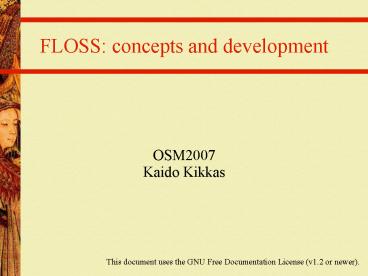FLOSS: concepts and development - PowerPoint PPT Presentation
1 / 12
Title:
FLOSS: concepts and development
Description:
Free and open-source software is actually about development and distribution mechanisms ... 1998 'The Halloween Documents', Freeware Summit, OSI. 2001 ... – PowerPoint PPT presentation
Number of Views:66
Avg rating:3.0/5.0
Title: FLOSS: concepts and development
1
FLOSS concepts and development
- OSM2007
- Kaido Kikkas
This document uses the GNU Free Documentation
License (v1.2 or newer).
2
Freeware?
- To address a popular misconception we are not
going to talk about freeware. Freeware is
proprietary software (just like MS Windows or
Adobe Photoshop) that just happens to have zero
price at the moment. Shareware is also a
different kind of animal - Price is actually the visible tip of the iceberg
- Free and open-source software is actually about
development and distribution mechanisms - Community is the key
3
In the beginning, there were hackers
- In the ancient times, every computer had its own
software gt it came with the computer just like a
spare tyre with a car - In the 50s and 60s, IT was regulated by the
government in the US gt no business. Rather,
larger centres attracted 'angry young men'
becoming the first-generation computer aces (see
also Hackers the Heroes of the Computer
Revolution by Steven Levy)? - Information wants to be free - all creation was
shared. At first, even passwords were shunned
4
The original Hacker Ethic (Levy)?
- Access to computers should be unlimited and
total. Always yield to the Hands-On Imperative! - All information should be free
- Mistrust Authority Promote Decentralization
- Hackers should be judged by their hacking only
- You can create art and beauty on a computer
- Computers can change your life for the better
5
The Business Age
- The 70s - software commercialisation (gradual)?
- A main reason increase of portability which
ensured 'critical mass' for commoditisation - Unix was closed up at the end of 70s, MacOS and
MS-DOS were closed from the beginning.
Proprietary operating systems were followed by
similar application software - About 1980-1995 software is a product like
everything else
6
Return of the hackers
- 1984 Richard Stallman founds GNU
- 1991 Linus Torvalds, Linux kernel
- 1992-3 BSD386 and free BSD Unixes
- Ca 1995 LAMP server technology
- 1998 The Halloween Documents, Freeware
Summit, OSI - 2001 OpenOffice.org
- 2002 Creative Commons
- Open Access Initiative, Flickr, Wikipedia...
7
Enter naysayers
- 1991 "who needs THAT?"
- 1993 "who cares to learn all that?"
- 1994 "who does business with that stuff?"
- 1995 "A server running Linux????"
- 1997 "Linux with graphical environment?"
- 1998 "Oracle on Linux...?"
- 1999 - "Linux and Heroes of Might and Magic?"
- 2001 "OpenOffice.org will never match MS
Office!" - 2002 "South America has lost its mind!"
- 2003 "Linux has no multimedia!
- ...
8
Free Software
- Richard Stallman and FSF
- Not only technical but also philosophical and
ethical category Helping your neighbour - Proprietary solutions are unethical
- Somewhat hard line but clear positions
- See http//www.fsf.org
9
Open Source
- Linus Torvalds, Bruce Perens, Eric S. Raymond
- Shut up and show them the code!
- Proprietary software is not unethical, just
sub-optimal - Pragmatical approach, sometimes can be
compromised (e.g. the Novell deal)? - See http//www.opensource.org
10
Uneasy allies
- Lots of common ground in practical projects
- Largely overlapping licensing, especially GPL
- The GNU General Public License (GPL) 1989/91/2007
- Central point authorship PLUS user's rights
- To copy
- To study
- To modify
- To redistribute the modified form
- Switch from a product model to a mixed model of
product/service with emphasis on the latter - The starting point for most phenomena of Open
Culture Open/Free Content, CC, Free Art etc
11
Homework
- Study the FSF and OSI websites and write a blog
review to compare the views of the two schools of
thought - Play Wesnoth ) Actually, you need to be
familiar with the game to be able to develop it - Discuss and try to determine the role
distribution at the project in your team
(storyline, graphics, music, storyboarding/
special events etc). Do some related research on
the game (from website)?
12
That's all for today































